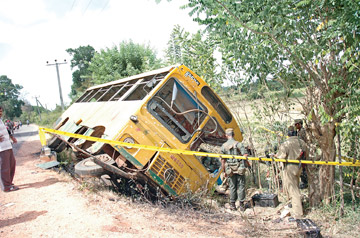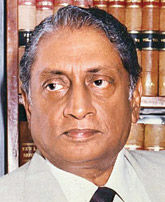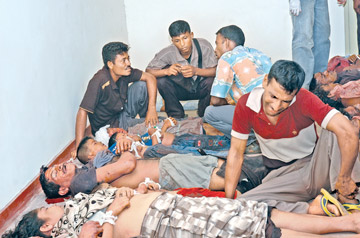Premadasa regime undermined Security Forces
By K.M.H.C.B. Kulatunga
The 13th Amendment to the 1978 Constitution of the Democratic
People's Republic of Sri Lanka has been a hot topic among most
politicians. A wide range of views has been aired by politicians, from
the Government and from the Opposition.
|

The ill-fated bus at Kebbethigollewa |
The 13th Amendment to the existing 1978 Constitution was made exactly
20 years ago - in 1983 by the then Government headed by late President
J.R. Jayewardene. He succumbed to international pressure and hurriedly
brought the 13th Amendment. The controversial Indo-Lanka Agreement and
the introduction of the Provincial Council system followed, amidst stiff
resistance by the Opposition political parties.
It was said that even most of the then Cabinet Ministers were kept in
the dark when Jayewardene inked the Indo-Lanka Agreement with the then
Indian Prime Minister Rajiv Gandhi.
A wide range of opinions have been expressed on the 13th Amendment -
13 plus, 13 minus and even the abolition of the amendment altogether.
Whatever it is, anything that could affect the country's sovereignty and
territorial integrity should not be tolerated.
Fearless leader
|

Lakshman Kadirgamar |
Certain Tamil politicians and Tiger cohorts are still daydreaming of
a separate state. They now resort to various tactics to win what
Prabhakaran could not achieve by an armed struggle, through democratic
means.
Fortunately, we have a fearless leader who will not bow down to
international pressure and would go that extra mile when it comes to the
sovereignty and territorial integrity of Sri Lanka. If not for his
political sagacity and farsighted vision, Prabhakaran could have well
achieved his goal.
Those who preach after the eradication of terrorism never practise
what they preach in their countries. Though the Western countries go all
out when it comes to their national security, they pontificate a
different theory to us. Of course they do have a right to protect their
people and their countries' sovereignty. But what they have conveniently
forgotten is that Sri Lanka too has an equal right.
British counter-terrorism police recently arrested three people
suspected of involvement in the killing of a soldier hacked to death in
a London street by two men shouting Islamist slogans.
|

Some of the victims and relatives |
The killing of the soldier, in what the government said appeared to
be a terrorist attack, led to angry protests against radical Islam and
fears of a possible anti-Muslim backlash. Michael Adebolajo (28) and
Michael Adebowale (22) were held under armed guard in hospital after
being shot and arrested by police on suspicion of the murder.
Three arrested
The three men arrested are suspected of conspiracy to murder. London
police said two of them were hit by electric Taser guns, but neither
needed hospital treatment. Eight people have now been arrested in
connection with the murder of 25-year-old Lee Rigby, who served in
Afghanistan. No one has been charged.
The British defence authorities had said that those who were arrested
have been under surveillance even before the arrest. But if Sri Lanka's
defence authorities have done the same, the West would have made a big
hue and cry over human rights. Of course, what the British authorities
have done was perfectly right as the West has been subjected to Al Qaeda
terrorist threats.
But what we try to emphasise is that Sri Lanka, as a sovereign
nation, too enjoys similar rights when it comes to national security and
the West do not have any right whatsoever to question the Government on
the measures it takes in the broader interests of the nation.
The British authorities have acted in such a manner for killing only
one soldier in an isolated incident. But hardly anybody in the West
uttered a word when LTTE terrorists killed 774 policemen attached to the
Batticaloa and Ampara police stations. The 23rd anniversary of that
brutal massacre falls on Tuesday.
June 11, 1990 could be considered the saddest day in Sri Lanka Police
history as it lost 774 policemen in the East. The policemen from the
eastern towns of Batticaloa and Ampara were forcibly taken into the
jungles, blindfolded, with hands tied behind their backs and shot to
death.
The incident took place after the Indian Peace Keeping Force (IPKF)
had just left the country and the Jayewardene regime was preparing for
peace talks with the LTTE. Though the atmosphere was tense, the
Premadasa regime gave strict instructions to the Security Forces not to
retaliate regardless of any provocations. Perhaps, the then UNP
Government would have been looking for peace at any cost.
Free hand
The Premadasa regime undermined the Security Forces and restricted
their control, thereby giving a free hand to the Tiger terrorists to do
anything they want in the guise of peace talks. The Security Forces
stationed in the East were ordered to confine themselves to their camps.
The ugliest part in humiliating the Security Forces was that they had
to even obtain passes from the LTTE, whenever they had to move out of
their camps. Perhaps, that would have been the one and only instance in
the world where a legitimate army took passes from a terrorist group to
go out of their camps.
The LTTE made full use of the peace talks and from April 1 to June
10, 1990 the LTTE cadres were building bunkers and other constructions
in the vicinity of Army camps. Once the LTTE strengthened their grip and
strengthened their military capability, they went all out, thereby
taking the Premadasa regime for a good ride.
The arrest of a contractor who tailored uniforms for the LTTE was the
closest incident to the abduction of policemen in the East. The arrest
incensed the Tigers and some LTTE cadres had even threatened Police
officers saying, that they would kidnap all policemen on the following
day.
The then UNP Government blindly believed that they could achieve
peace at any cost and was willing to give anything that Prabhakaran
demanded in the guise of peace. Calls for reinforcements, and permission
to use weapons against the Tigers were turned down by the then President
R. Premadasa, thereby forcing the Security Forces to risk their lives.
The Police was instructed to solve the problem through negotiation.
Policemen massacred
On June 11, 1990, police stations in Batticaloa, Kalmunai, Vellaveli,
Valachenai, Kalavanchikudi, Eravur, Samanthurai and Akkaraipattu were
attacked and hundreds of policemen were arrested by the LTTE. They also
ransacked the armouries of the police stations and took away hundreds of
T-56 rifles, shotguns, machine guns and many other weapons.
The terrorists then herded the policemen into buses and took them to
the Thirukkovil jungle. The LTTE made them lie face down on the ground,
with their hands tied behind their backs.
"They flashed a torch on our faces and shot us one by one. I was shot
on my arm and managed to run and hide in a small village," SI Shantha
Ranaweera, a resident of Galgamuwa and one of the few survivors, was
quoted as saying. Of the 899 policemen arrested by the LTTE on that day,
only 125 managed to survive.
This week marks the anniversaries of several other LTTE atrocities,
including the brutal killing of 13 Sinhalese settlers by armed Tiger
terrorists at Dehiwatta, in the Polonnaruwa district on June 11, 1985.
On June 11, 1986, two bombs exploded in two CTB buses in front of the
Bank of Ceylon and the other in close proximity to the SP's office,
along Inner Harbour Road, Trincomalee almost simultaneously. The two
buses were plying to Kantalai and Colombo. 22 persons were killed due to
the explosion and 75 others were injured.
Prabhakaran always thought that the LTTE was the sole representative
of the Tamils. Hence, he did not leave room for any of his rival terror
groups or moderate Tamil political leaders to win the hearts of people
in the North and the East. On June 14, 2003, the leader of the EPRLF,
Thambirajah Subathiran was murdered in Jaffna by an LTTE sniper.
Subathiran had been critical of the way LTTE had been harrasing the
Tamils in Jaffna. He ultimately paid with his life.
Bus blown up
LTTE terrorists attacked a packed passenger transport bus on June 15,
2006, by triggering a couple of hidden bombs that killed at least 64
people. It was the worst LTTE attack since the 2002 ceasefire.
Among the unfortunate victims were at least 15 children, their blue
school uniforms coated with blood and gore as authorities laid out the
corpses at Anuradhapura Base Hospital. Seventy eight people were wounded
in the attack.
The bus was blown up with land mines hung from a tree detonated by
remote control. Rigging bombs to trees or bicycles had been a common
LTTE tactic, so the ground does not absorb much of the blast.
Most of the passengers in the ill-fated bus were heading to the
funeral of a policeman killed in another LTTE attack. The roof of the
bus was stained with blood with shoes, mobile phones and other
belongings scattered around.
The LTTE terrorists unleashed its profound killing spree since
August, 2005 with the assassination of Foreign Minister Lakshman
Kadiragamar. Four months later, the Tigers killed 12 sailors, the first
major attack in four years.
After a 28-year bitter and internecine struggle with LTTE terrorists,
Sri Lanka finally achieved peace in May, 2009. Since then, the country
has achieved a praiseworthy milestones in resettlement, development and
national reconciliation.
There has been a billion dollar program for the North and East,
building the lives and infrastructure of the people in the two
provinces. More importantly, over 11,600 ex-LTTE cadres have been
rehabilitated and absorbed into society after life skill development
programs.
The Northern and the Eastern provinces have been developed on par
with other provinces and the people in the two provinces have begun a
new life.
Why can't the West, especially those who level allegations against
Sri Lanka at the UNHRC, see these positive developments? They can't
expect us to perform something which no other country had achieved so
far after a conflict situation.
Hence, Sri Lanka needs time to fully implement its reconciliation
mechanism. No country could force anything on us. The democratically
elected Government is only answerable to the people of this country and
not to the peace agents of the West. |


